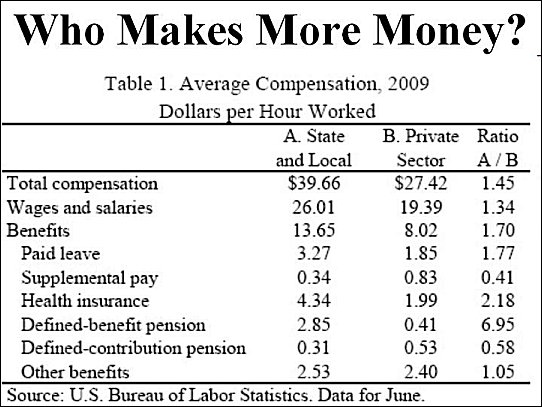|
To the Editor:
Many Goffstown residents have to work for a living. That is an obvious statement. They might work in the private sector or they might work for the government. Unfortunately, it is becoming apparent that there are some big differences between the two employment sectors.
This is unfortunate because the government employment sector is pulling away from the private sector in terms of total compensation (wages + benefits.) Perhaps nobody really intended that it turn out this way yet that is exactly the situation that happened. This needs to be addressed.
The embedded graphic (US Bureau of Labor Statistics, 6/09) shows the “Average Compensation, 2009” for the US for the state and local governments compared to private sector employees.
The data isn’t specifically for Goffstown, so more research will need to be done to be clear about the details of the town and schools total compensation.
The town data is real and something can be done to change it. It is just that the labor lines on the total Goffstown budget represent the majority of the budget and must be scrutinized if there is to be any real cost control. Any insights from analyzing the compensation numbers should be helpful.

In the past, it was probably true that government employees weren’t paid so well. That was one of the reasons that benefits such as very generous pensions, healthcare, step raises, longevity bonuses, overtime availability and others were improved dramatically. Now government workers wages are better and they have retained the extraordinary benefits. The times have changed again however.
The Internet has a lot of data that shows that the average private family income has been flat for at least the last 10 years. One of the reasons that this happened is that most US non-military multi-national manufacturing has been shipped outside the US for lower competitive wages.
The Goffstown “binding contractual” compensation agreements include yearly automatic raises of up to 4-5% for some town employees. That means that at a 5% increase per year, that sectors wage will double every 14 years. Not too bad in today’s economic climate! There are other differences.
The benefits at the average national, state and local government levels are vastly superior to the private sector. This is so obvious that it “jumps right off the page!”
NH has a two-tiered retirement system. One tier can retire at 45 years old with 20 years of service.
This pension can also include the overtime from a second detail job during the “final 3 years!” That means that for that employee there is the possibility of a second retirement and the label of a “double dipper.” With excessive overtime, the retirement pension(s) can be higher than the original base pay. There are people in town who are retired and, who are or will be, working on their second pension. Contrast this with retirement benefits in the private sector.
Many non-government employees will be lucky to be able to retire at all, let alone have a single or double pension. They will also be left having to pay the pensions of the government worker.
It is understood that government workers, their family and friends may want benefits to remain.
George Bernard Shaw once said: “A government that robs Peter to pay Paul can always count on Paul’s support.” Hopefully that won’t be true in Goffstown as employee negotiations progress.
I just thought that you had a “Right to Know (R2K).
Ivan Beliveau
Goffstown
|





